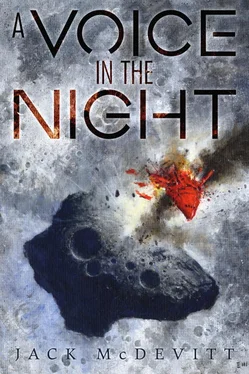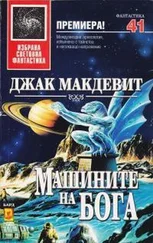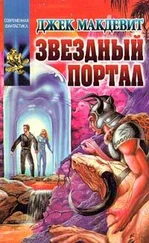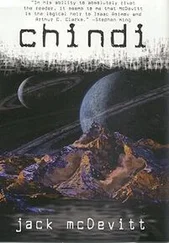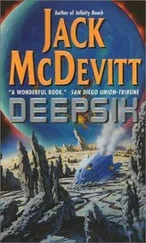Ward’s stomach felt cold.
“Maybe we could disconnect one of the commlinks and take it to the cage?”
He saw no other choice. But he didn’t know a thing about them. And they’d be working in the dark.
She looked at him, and anger flashed. “Come up with something, Edgar.”
He looked away from her. Toward the floor. Up at the comsat.
Her eyes followed his. “If we had even a flashlight,” she said, “we could sit here and bounce an S.O.S. off the thing.”
The search for the flashlight was desperate, swift, and futile. They moved through the dark dome, yanking open drawers, feeling tabletops, struggling with cabinets. Ward’s frustration raged. How could they have been so negligent? What was the point of compartmenting if you had to be in the annex to survive?
How could he have been so dumb?
They groped through doors and across desks. He checked the washroom. She examined the operations office.
Almost two hours had passed since the quake. And the air was beginning to feel a trifle stuffy.
The telescope towered overhead. “You know,” she said, “we’ve got a quasar inside that thing. And we can’t produce a goddam flashlight.”
He sat back on a desktop. “Not a very auspicious start for you,” he said.
She banged a door shut. “Nothing,” she said. “I can’t believe there isn’t one here somewhere.”
Quasar. She was right: their quasar was brighter than a thousand galaxies. Why did they need a flashlight? With an index finger he couldn’t see, he drew an imaginary line out of the eyepiece toward the side of the cage. Then down onto the floor of the dome. Toward and through the slightly less black patch of darkness at the airlock into the passageway. And up into the sky. Four lines. Three changes of direction. “Amy,” he said, “there’s a mirror in the washroom.”
She did not answer.
He was redrawing his lines. No reason why it should not work. “My watch case is reflective. That makes two.”
“Edgar, what are we talking about?”
“You’re right,” he said. “We’ve got light. All we have to do is get it to the comsat.”
She touched his wrist. “It might be possible.” Back out in the passageway, where they could see, she produced a pocket computer and released the cover. Stars glittered in the polished metal. Not perfect, but close enough.
Three.
The washroom mirror was metallic. It was framed over the basin, about the size and dimensions of a medicine cabinet. Pieces of the wall came out with it.
They selected a location on the floor that combined lines of sight with the cage and the passageway. When they were satisfied, they set a chair in place and put the washroom mirror on it. “Once we’ve got the angle, we’ll tie the mirror down to keep it steady.”
It would be simple. And elegant.
Ward was pleased with himself.
He returned to the ladder. Once more into the dome, dear friends. He climbed quickly in the light gravity. Despite his concerns, he was actually beginning to enjoy the experience. If he could make this work, it would make a rousing finish to his tour at World’s End. Hell, this was the stuff of legend.
Within a few minutes he was back in the observer’s cage.
The quasar was still there.
He estimated where he would mount Amy’s computer cover, a little above belt high on the wall to his left. Then he removed two mesh panels to provide an unimpeded angle to Amy’s position on the floor. He stacked them well out of his way, reminding himself that he now had no protection on the open side of the cage against a seven-story fall. With the same thought, he felt around until he found and stowed the canvas bag in which he’d carried the amplifier.
Next he turned to the eyepiece assembly. It was held in place by four screws. He removed these, pulled the assembly clear, and set it on the floor. A smear of light now touched the mesh wall about a foot above the table. He opened Amy’s computer, and reluctantly broke off the cover.
He moved the coffee tin and put the cover on top of it, in the light. Then he adjusted the focus. The light beam from the telescope brightened, and a patch of wall on the far side of the dome lit up. “Okay,” he called. “We’re in business.”
Amy cheered him on. He angled the beam down the wall. But the floor of the cage cut it off. He adjusted the eyepiece housing and moved the mirror higher. Moved it as high as possible. The luminous circle went down, but still did not reach ground level. “This might not work after all,” he called.
“Why not?”
“Angle’s not good.” The light beam drifted out into the dome. He felt very high, and very exposed. “I don’t see how we can do it without another mirror.”
She was slow to respond. When she did, her voice sounded tired and far away. “Is there another washroom?”
“In the annex.”
“How about the telescope? Maybe there’s a spare mirror in the telescope?”
“No—”
“A redundant mirror, maybe? Reflective metal? Do we have reflective metal anywhere?”
“I wish,” he said, “we had some lights in here. There might be something, but I’m damned if I can think what it might be.”
He heard a crash, and knew she had tossed something. Bostonian good manners giving way to frustration.
Maybe the bureaucrats were right. Maybe this is no place for people.
He sank down, between the observer’s chair and the table. The computer cover was rectangular, about the size and general dimensions of his hand. The mirror itself was dark, though he could see the red reflection of the quasar at the far end of the cage.
Amy’s voice floated up from the well. “Coffee,” it said.
Ward was weary, and in no mood for jokes.
“Coffee,” she repeated. “Use the coffee tin.”
The light beam struck the computer cover, which was tied to the mesh wall with strips from Ward’s sleeves and angled by packing the canvas bag behind it; it flashed on a downward trajectory until, at the far end of the cage, it glanced off the bottom of the coffee tin, which was tied to a table leg by shoe laces and the rest of Ward’s shirt. Then it fell seven stories to the bathroom mirror, to whose stability Amy had contributed her blouse; passed through the air lock, and was deflected by Ward’s watch case back into the sky. Toward the approaching comsat.
Three shorts. Three longs. Three shorts.
S.O.S.
“We were lucky,” she said, spearing a piece of cheese.
Ward sipped his drink and smiled. “Lucky, hell. We were good. We saved ourselves. And we saved NASA some money.”
Amy’s eyes were glowing. “I can’t help wondering where we’d have been if you hadn’t had a shiny watch case? Or if I hadn’t been carrying my computer?”
“We’d have come up with something else.”
“That’s easy to say. Listen, this experience underscores the philosophy that deep space should be left to robots and automated systems.” She dipped her cheese into the mustard, and gracefully swallowed it. “Things go wrong too often. When they do, people die.”
“When they do, people make it work anyhow.” He smiled at her. At that moment, he was aglow with self-satisfaction. “They can’t send us home. Somebody has to be here to pick up the pieces. We’ll be going back to World’s End, Amy. And beyond.”
Читать дальше
